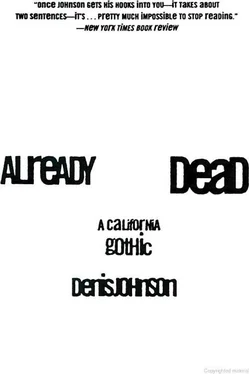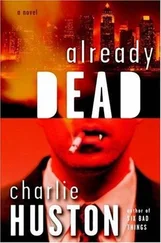“This is where the Lord sent me.”
“Yeah…A lot of people get sent to the coast.”
“Or maybe I think Satan gave up chasing me here.”
“Well, you could end up going up and down it. People get sent here but — highway madness. They just go up and down this coast forever.”
“My car couldn’t handle that.”
“Yeah. Yeah…I just had to ask you what brought you here.” She jammed her hands in her pockets, stood there stiff-armed. Smiled, when she thought of it.
“He was way past due,” Fairchild said, “but it hurts just as much.”
“I believe it. I’ll be praying for you.”
“Do you go to church?”
“When I can.”
“Have you been to West Point? There’s a tiny little church there. They work miracles there all the time.”
“I believe it if you say it.”
“Get them to pray for my father,” he said.
“I will.”
Mo had located a spot near the cemetery’s edge. Navarro let her go on and stood with the toes of his service shoes just touching the cut border of fresh sod over the ter-208 / Denis Johnson
minal rest of Nelson Fairchild, Sr., who had lived on this earth from June 7, 1928, until just last week. Californian : so read his epitaph.
They spread a picnic among many such Californians, and Navarro popped the cork on a red wine while Mo worked open a can of smoked oysters and cut up some cheese. Before they got to the sandwiches they weren’t hungry anymore and fell to kissing and talking. Navarro was happy with his decision, which he’d come to on their first night together, to let his heart run away with him. He lay next to her looking sideways at the headstones, feeling privileged to associate with these families, some of whom pre-dated even the building of the coast road, counting himself almost a participant in their blank-faced courage. Pre-dated even the pigs. They’d brought the pigs here, in fact. The pigs had gone wild and now flourished, hounded, lean, and gamy, inland among the hills. He lifted Mo’s sweatshirt above her breasts and spilled wine onto her belly, which was hardly there. Her breasts were meager and her chest thin, frail, the rib cage very much a cage, her heart kept inside like something that would otherwise fly up out of her and get away.
Navarro licked wine off her nipples. “Yep. That definitely gives the vintage a boost.”
“Here.” She kissed his lips, and he tasted more.
“Hey. Am I in heaven?”
“I guess in this neighborhood, you’re getting close.” True enough. He crawled over to a patch of sunlight on a grave and lay back in grasses like voluptuous bedding.
“That ocean’s got more sounds than a city,” he said. He didn’t know if she was listening or not.
She crawled over beside him and said, “The Indians used to believe the sea would kill you if you just waded in as far as up to your ankles.”
“Oh, I didn’t know that.”
“Yeah. They did. They wouldn’t go in it.”
He shut his eyelids over a red pulsing warmth and felt beneath and all around him these many Californians floating in the dirt. Around quiet almost archeological places like this you started to think about the continents drifting for millions of years toward their present berths.
Not ten miles north, a flatbed valley crossed the coastline and carried on down to the shore and then past it, out under the water. This was the famous San Andreas Fault. West of the road where the fault line, verdant and full of breezes, pitched toward the sea, a Already Dead / 209
farm — an orchard, a white house, a red barn, a gray silo — waited, dealt out like a throw of dice on the floor of the trough while the earth held its breath.
“Listen,” he told her, “this thing could work. It’s already working.” With her chin on the backs of her hands, stretched out flat on her stomach, Mo stared over the surface of the grasses. “I don’t fall in and out of love that quick.”
“I never said I did either.”
“You’ve got the moves, though. You’re fast.”
“Not really.”
“Fast, boy.”
“I can slow down.”
“But your foot’s still touching the pedal,” she said, laughing.
“For the right person I can slow way down.”
“Would that be somebody like me?”
“The feeling definitely has that quality.”
“Yeah? What quality.”
“The quality of I want those pretty tits to kill me.” She started to laugh. But her eyes stopped dead. “Man, I know what you mean.” She undid the front of his pants, and he slid himself up inside the leg of her shorts, and onward. It felt just right, and then even better when she looked up over the edge of some huge late sorrow and said, “Man, we’re so good together.” He could hardly believe his luck, that it should come back again one more time after all those other women.
The sunset tossing the headstones up out of black shadows, and the green graves of all the dead strangers.
They lay quite still until he thought he’d come just from being inside her, or rather from her graciousness in permitting him there. Then they heard the sound of a small bothered engine nearby.
A rectilinear old-model black Saab came along among the headstones with its nose bobbing like a hound’s over the trail. Parallel to them along the bluff it stopped, and a solitary man got out and started juggling maybe as many as half a dozen things, tennis balls or the like, his knees flexed and his head arced back slightly and his hands and head and shoulders moving a little and in a way that made him look, at first glance, as if he was only pretending to credit himself with the running of this system; as if though he turned away it would abide; his face making small circles linked as by the hub of a camshaft to the 210 / Denis Johnson
more majestic orbits of this flotilla he’d set before himself, in truth nothing about its flight escaping his concentration, its planets impelled and guided by his attentions. He stopped his head. The worlds descended and he gathered them out of the air to his breast.
“I think he’s coming over,” Mo said.
Navarro slipped himself out of her. Not what he’d have predicted.
You’re lying here screwing in the grass and a juggler comes and practices in the cemetery.
He adjusted himself and yanked surreptitiously at his zipper and wondered: should I arrest him? The guy stood on the bluff with his long shadow hitting a headstone and absorbed by it, and the headstone letting out its own shadow about the length of a grave.
“Salutations and prestidigitations!”
Navarro couldn’t understand why so many coast people wanted to look like fairy-tale creatures. He’d have marked him for a reefer fiend but doubted any but the clearest synapses could have passed the necessary signals between those eyes and hands.
He wore a Jamaican beret and a brown beard divided at the chin into two braids, and was small with a stunted, vegetarian smallness. He’d clothed himself in patchwork burlap, not colorful, but of many origins.
He began juggling again as he walked crab-legged toward them, feeling along the earth with his feet.
“I like it here this time of day. Can you guess why? — because the shadows make it look like every grave is open. As if our friends have gone wandering. If you came here at the right time of night on the right night of the year, you could see that same vision — only by full moonlight.
“Watch my eyes. Watch the eyes. W. C. Fields could read the label on a seventy-eight RPM record while it spun. The World’s Greatest Juggler they called him. He was also the world’s greatest comedian, and one of the great consumers of martinis. He didn’t drink all that many. But they were big mothers. I am the most prestidigitous trigetour…in all of trolldom.”
Читать дальше












